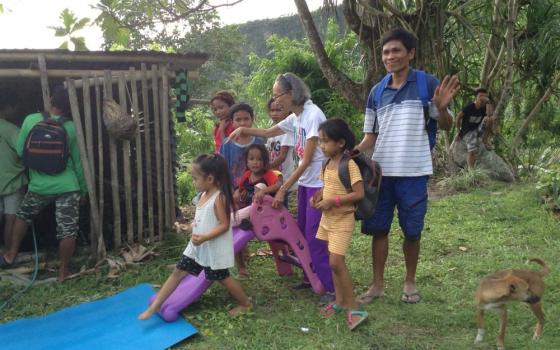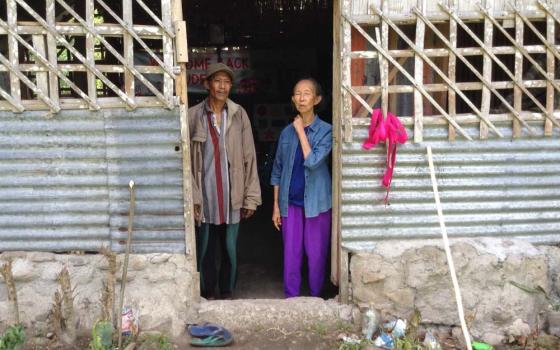In many ways, time has stood still in the Philippines when it comes to people who live in poverty.
Sisters continue to stand with the people in their pursuit of justice. Social justice activism among sisters has a long history in the country, beginning in the 1970s during Ferdinand Marcos' regime. Today, these fearless women continue to be a threat to the government as they speak out against injustice and discrimination.
I remember being excited to meet a number of them belonging to a group called Sisters Association of Mindanao on my first visit to the Philippines in 2003. These sisters work in the southern part of the country with the communities of Muslims and indigenous people. I wanted to accompany them into the mountains to witness their work, but even at that time, we were turned back by military activity against the local farmers who were supposedly subversives.
Luckily, as I continued my travels, I was able to meet Sr. Aquila Sy, a sister well-known to the provincial and local government of Negros, and feared for her work for justice. Aquila was one of the first Filipino women to become a Sister of the Presentation of the Blessed Virgin Mary. She courageously took on the cloak of Nano Nagle, foundress of the Presentation Sisters in Ireland in the 1700s. Nano also engaged in dangerous activity for the sake of the discriminated.
Aquila's work was systemic and direct. As principal of Binalbagan Catholic College, she made sure the students understood the social teachings of the Catholic Church and their responsibility to make the teachings real in their own situations. She was also personally involved with landless families and unjustly treated sugar plantation workers.
Her activities, both in school and out, made her a target of government surveillance and death threats that drove her to leave the country for fear of her life. Here is her story.
I am what some might have called in those days an "older" vocation, even though I had longed to become a sister even at age 17.
Few women in the Philippines have opportunity for education, so I followed friends and family who wisely advised me to finish college, where I graduated magna cum laude for my accountancy major.
Although my father never pressured me to follow him in business, I imagine he was proud that I did, as we were very close. I worked at a bank as assistant chief of foreign exchange for 13 years to help support my family of nine siblings.
Helping my family was a Chinese tradition not unlike what my father did. He was a Chinese national who first visited the Philippines at age 11 but returned to China to help support his family. He came back to the Philippines as an adult to manage a large business for an uncle who had gone home to China. My father was not a Catholic and told me he believed in Confucius and living by his golden rule: "Do unto others what you would have others do unto you." He never went back to China but stayed in touch with his family by letter.
He married my mother, a devout, practicing Catholic who had many religious and priests in her extended family. Together, they participated in the Philippine culture of generosity and care for those in need.
In the early 1970s, we heard about the Negros sugar workers, particularly the migrants, sacadas, and the many rural poor. You may wonder why the term "Negros" is used. When the Spanish came to the islands in 1565, they found dark-skinned natives and named the land Negros. One of the earliest settlements of the ethnic group the Spanish called Negritos was Binalbagan, and it is where we Presentation Sisters started our education ministry.
Throughout my life, the conditions of the migrants and the poor touched me deeply, and this, plus my friends worrying about me still not being married, induced me to reexamine my life. I had heard about the Presentation Sisters and their strong commitment to justice from a Redemptorist priest. I took a long look and decided they were the right group for me. I entered in September 1974.
The sisters had come from Ireland to the Philippines in 1960 at the invitation of Irish Columban priests. They invited the sisters to Himamaylan City, Negros Occidental, south of Bacolod, the provincial capital, to manage Our Lady of Snows High School. Later, they developed the Binalbagan Catholic College. I was its first principal.
The Columban priests were strongly involved in social justice and found the sisters with the same passion. The sisters opened a ministry for the sugar workers and others living in poverty, finding funds to offer scholarships, house repairs and medical assistance. Sisters in Australia and Ireland were benefactors and continue to be even today.
In 1972, the government declared martial law. Families in mountain parishes, ministries of the Columban priests, were suspected by the military to support the New People's Army. This was a rebel movement seeking justice for families living in poverty and those who were landless, having had their ancestral land confiscated by the wealthy farmers. Hundreds of sugar workers were killed, identified as rebel leaders by the military. Even members of basic Christian communities were targets.
The sisters' convent was a shelter and medical post for many of the families. Military and police would often surround our convent, suspecting we were harboring rebels.
Martial law continued for 10 years, and during this time, I became the principal of Binalbagan Catholic College. The police and military continued surveillance of us and spread rumors that we were communists. They claimed that I personally and with others planted bombs in strategic places, including churches. They heard we were teaching our students about the social teachings of the Catholic Church and thus inciting rebellion. Admittedly, we held in-school annual trainings for the public to discuss the structures of our society that promoted poverty and oppression of the majority.
Many other Catholic schools and basic Christian communities through critical analysis and Scripture reflection began asking questions, too, particularly about who was behind the martial law and the reasons for its continuation. I had joined a nongovernmental organization called Promotion of the Church Peoples' Response to invite people of all different faiths to pray, think and take action together against the use of torture, abductions and unjust arrest. I was also part of an organization of sisters called Rural Missionaries of the Philippines. Numbers of our members were arrested, killed and went missing.
Eventually, martial law ended, and Cory Aquino gave us hope. But what was known as the "total war" policy still pervaded the military and their activities: Nightly bombings in the mountains of areas suspected as rebel strongholds continued, along with tortures and abductions. There were mass evacuations to town centers for safety.
All of our Presentation Sisters were involved with providing food and shelter for these internal refugees, and I was at the forefront of giving assistance for medical services. For the first time in my life, I watched a 12-year-old girl die before my eyes because of dehydration. My intimate involvement with the people brought attention from the provincial and local government and the military of Negros. These groups began to organize people through bribes and rewards to keep watch on me. My effigy was burned in our town, and my name was written all over the locality identifying me as a rebel and dangerous. Finally, my congregation decided I needed to leave the country for my own safety. I was gone for six months. I stayed in Ireland for six months and returned at the time that Mount Pinatubo erupted in 1991.
When I returned, I worked in the national office of the Rural Missionaries of the Philippines as the national program coordinator. Our focus was fisherfolk, landless families, sugar workers and indigenous people. Our purpose was to help them know and claim their rights and to stand up for themselves.
After three years, I returned to the Binalbagan school as principal and remained there for six years. I am no longer a member of the Rural Missionaries of the Philippines but continue my work with the people I have grown to know and love, and walk with them in their difficult journey. Thirty percent of these families still survive on $1 a day. Even housing in some areas is only bamboo and thatch, although most have access to water and electricity.
Poverty still deprives children of education. They drop out of school to work alongside their parents to earn their meager incomes. In fact, Negros Occidental has one of the highest numbers of poor families in the country and yet, because of sugar production and renewable energy industries, it is one of the wealthiest provinces.
Our whole area of Asia-Pacific is struggling with sustainable development. Just this past March, I attended the Forum on Sustainable Development in Bangkok. Over 200 civil society organizations in the Asia/Pacific region came to defend policies that protect the environment and seek new ways to develop our part of the world. There is so much work to do, and I feel happy to be part of making a difference where I can.
[Joyce Meyer is a member of the Sisters of the Presentation of the Blessed Virgin Mary and GSR's liaison to women religious outside of the United States.]



